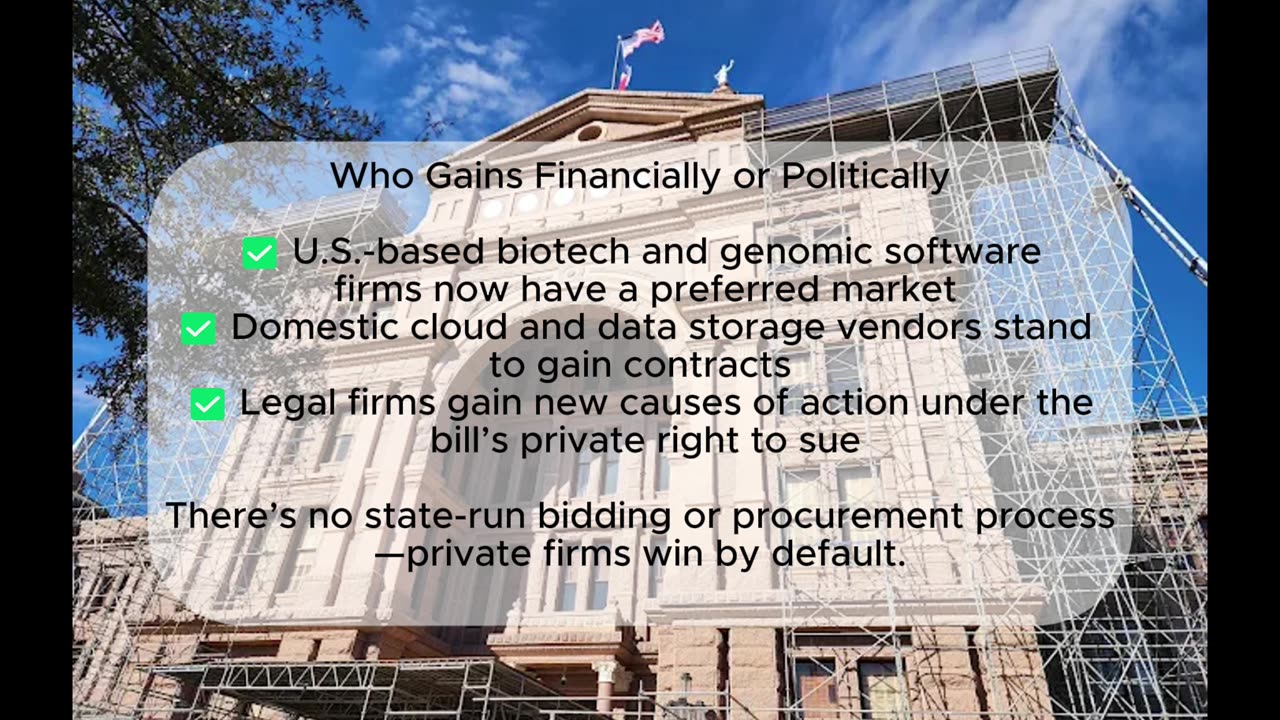Premium Only Content

HB 130
"✅ TEXAS JUST PASSED HB 130 — AND IT'S A START TOWARD PROTECTING YOUR DNA FROM FOREIGN HANDS
If you’ve ever taken a genetic test, donated blood for research, or had your genome sequenced as part of a medical procedure—there’s a chance that data was stored, sold, or analyzed using foreign technology. HB 130 is Texas’s first serious move to shut that door.
Here’s what it does:
HB 130 bans the use of genetic sequencing tools, software, and data storage systems tied to foreign adversaries—especially China. It requires that genomic data from Texans stay on U.S. soil, be encrypted, and be protected from outside access. It also gives Texans the right to sue if their data is mishandled and empowers the Attorney General to go after violators.
Why this matters:
Genetic data isn’t just health information—it’s a biological blueprint. In the wrong hands, it can be used for surveillance, discrimination, or even targeted biological weapons. That’s not a theory—it’s a risk acknowledged by national defense experts around the world.
HB 130 says Texas isn’t going to wait for Washington to figure it out.
What changes:
✅ Foreign-linked biotech tools and software are off the table for use on Texans
✅ Companies and nonprofits must keep your genomic data stored in the U.S.
✅ Encryption and cybersecurity protections are now required
✅ You can sue if your data ends up in the wrong hands
✅ The AG can fine violators up to $10,000 per incident
And here’s what’s still missing:
⚠️ The bill doesn’t fund audits or active enforcement—it relies on annual legal paperwork
⚠️ It doesn’t touch public or open-source DNA data, which can still be used and sold
⚠️ It doesn’t define cybersecurity standards clearly, which could lead to uneven protections
But it’s a step forward. It draws a line in the sand that says our DNA isn’t up for grabs—and that Texans deserve some basic protections in an industry known for quiet data deals and little public oversight.
Who pushed for it?
Lawmakers with national security leanings, along with defense-aligned nonprofits like The Jamestown Foundation and State Armor. This wasn’t a lobbyist-heavy corporate bill—it’s part of a broader strategy to reduce tech dependencies on foreign adversaries.
What Texans get out of it:
🧬 More control over how genetic data is used
🛡️ Legal recourse if something goes wrong
📍 A first move toward genomic sovereignty at the state level
The big picture:
HB 130 won’t stop all risks—but it sends a clear message that Texans' DNA is not for sale to hostile foreign powers. It plants the flag on something most states still haven’t touched. That’s worth recognizing.
We’ll still need follow-up:
A clear technical rulebook, not vague language
A watchdog entity with real oversight powers
Tighter restrictions on the resale of “anonymous” DNA data
But for now, HB 130 does what a green bill should: it helps more than it harms, and it puts the public interest ahead of political games.
✅ #HB130 #GenomicSecurity #TexasPolicy #DNAProtection
Quick ask, y’all—likes help the algorithm, but shares are what get the truth out.
If this bill affects you, your kids, your patients, your neighbors—please share it.
Too many Texans don’t know what’s being signed into law. And if we don’t share it, they won’t hear it. These bills move quietly. The consequences don’t.
It’s not about going viral. It’s about making sure the people who need to know—do know.
So if this post made you pause, think, or get fired up… don’t just like it. Send it. Share it. Say something.
We don’t get transparency unless we demand it together."
-
 LIVE
LIVE
SpartakusLIVE
5 hours ago#1 HERO of the PEOPLE || Ending the Week with FUN, WINS, and LAUGHS
434 watching -
 LIVE
LIVE
SynthTrax & DJ Cheezus Livestreams
15 hours agoFriday Night Synthwave 80s 90s Electronica and more DJ MIX Livestream THE FLOATING WORLD / Variety Music Edition
181 watching -
 LIVE
LIVE
Eternal_Spartan
11 hours ago🟢 Eternal Spartan Plays Destiny 2 | FPS Friday | | USMC Veteran
152 watching -
 2:04:11
2:04:11
MattMorseTV
5 hours ago $1.31 earned🔴The UK just hit ROCK BOTTOM.🔴
46.5K121 -
 LIVE
LIVE
iCheapshot
3 hours ago $0.04 earnedBack From Vacation! | Checking Out Skate Maybe Some Boarderlands 4
239 watching -
 LIVE
LIVE
Jorba4
2 hours ago🔴Live-Jorba4- Borderlands w/ The TRIBE
93 watching -
 54:43
54:43
Glenn Greenwald
6 hours agoGlenn Reacts to Netanyahu's UN Speech; PLUS: Q&A on Trump's Russia/Ukraine Policy, the Tom Homan Investigation, and More | SYSTEM UPDATE #522
72.9K40 -
 43:54
43:54
Donald Trump Jr.
5 hours agoJames and the Giant Breach, Plus Explosive J6 Revelations | TRIGGERED Ep.277
155K177 -

MadHouse_
5 hours agoFRIEND FRIDAY! - Garys Mod ? im pretty sure im gonna lose at this game
23.8K5 -
 2:26:51
2:26:51
blackfox87
4 hours agoBorderlands Grind Continues | PREMIUM CREATOR | #DisabledVeteran
23.3K1